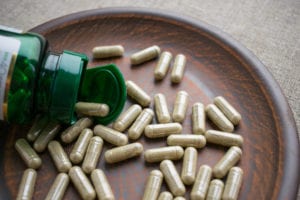
The Great Biotin Debate
July 14, 2021 | Nutrition
THE GREAT BIOTIN DEBATE
What Is Biotin?
Biotin, also known as vitamin B7, is a water-soluble vitamin known to be essential for a healthy metabolism. At normal levels, this vitamin helps the body convert food to energy, is anti-inflammatory, improves brain function, and increases the good cholesterol HDL. It is also essential for embryonic development so is mandatory for a healthy pregnancy. Deficiency in this vitamin causes diffuse hair loss and a red scaly rash, this is very rare as it is commonly found in many foods. Liver, egg yolk, almonds, soybeans, whole grains, bananas, and cauliflower are particularly high in biotin.
 Recommended Intake
Recommended Intake
The FDA recommended daily allowance of biotin is 30-100 mcg per day. High-dosage, in some cases 650 times the recommended daily intake, has been touted to help reverse hair loss. Normal levels of this vitamin are necessary to form keratin, the protein-making up skin, nails, and hair. However, high dosages have not been proven to improve hair loss. Male pattern hair loss and female pattern hair loss, in particular, are genetic and hormone-related and are not improved with high-dose biotin. Recent reports show that this can be dangerous.
Warnings About Taking High Dosages of Biotin
The FDA recently released an alert that high dose biotin can interfere with certain lab tests and cause incorrect test results. High levels of this in patients’ blood samples can cause falsely high or falsely low results, depending on the test. For example, this vitamin can make troponin levels appear low or normal when they may actually be elevated.
Elevated levels of troponin are a marker that the patient may be having a heart attack. If troponin levels appear low a heart attack could go undiagnosed. The FDA reported that a person on high-dosage supplementation died of a heart attack that went undiagnosed due to a falsely low appearing level of troponin.
High-dose biotin can also alter the results of thyroid tests such as TSH, T4, and T3. Hormone levels such as parathyroid hormone, follicle-stimulating hormone (FSH), latinizing hormone (LH), and cortisol can also be affected. Vitamin D levels have also been found to be inaccurate. It is unlikely that recommended daily allowances of biotin will skew laboratory results. Before undergoing any of the above laboratory tests, anyone taking this supplementation should inform their healthcare provider.
Call MD Hair Labs to schedule your no-cost, no-risk consultation with our expert physicians and hair technicians about hair health!
